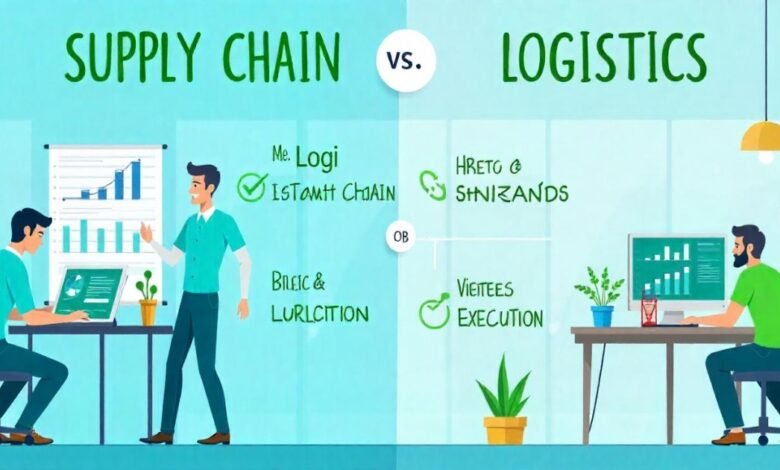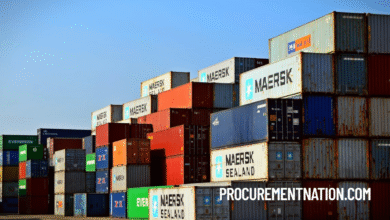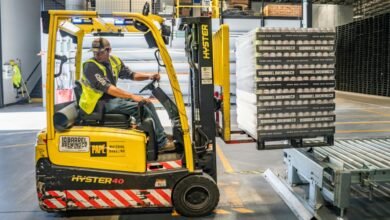Supply Chain vs Logistics: What’s the Difference?

Introduction
Global economy, the terms “supply chain” and “logistics” are often used interchangeably, but they refer to distinct concepts. Understanding the difference between supply chain vs logistics is crucial for businesses and professionals working in these fields. While both deal with the movement and management of goods, they each have their own scope, processes, and goals.
In this blog post, we’ll break down what each term means, their key components, how they differ, and why understanding the distinction matters. Whether you’re running a business or planning a career in the industry, knowing the difference between supply chain and logistics is essential.
What is Supply Chain Management?
Definition
Supply chain management (SCM) refers to the process of overseeing the production, shipment, and distribution of products. It’s the broad system that encompasses everything involved in getting raw materials, manufacturing products, and delivering them to end consumers. From sourcing raw materials to delivering the final product, SCM covers every step of the process.
Key Components
The key components of a supply chain include:
- Sourcing and Procurement: Securing raw materials or components from suppliers.
- Manufacturing: Transforming raw materials into finished products.
- Distribution: Managing the flow of products from warehouses to retailers or customers.
- Inventory Management: Monitoring stock levels and managing demand to ensure timely delivery.
- Supplier Relationships: Maintaining strong relationships with vendors and service providers.
Goals and Functions
The primary goals of supply chain management include reducing costs, improving efficiency, ensuring timely delivery, and increasing customer satisfaction. It also aims to integrate various functions like procurement, production, and distribution to streamline operations.
What is Logistics?
Definition
Logistics, on the other hand, is a narrower subset of the supply chain that focuses specifically on the transportation, storage, and delivery of goods. It’s the process that ensures that products are efficiently moved from point A to point B, whether that’s from a warehouse to a retailer or from a factory to a customer.
Key Activities
Key logistics activities include:
- Transportation: Managing the movement of goods via road, rail, air, or sea.
- Warehousing: Storing goods before they are sold or distributed.
- Inventory Management: Keeping track of stock levels, ensuring availability without overstocking.
- Order Fulfillment: Picking, packing, and delivering products to customers or retailers.
- Returns Management: Handling products that are returned due to defects or customer dissatisfaction.
Goals and Functions
The goal of logistics is to ensure that products are delivered in the right quantity, at the right time, and in the right condition. It aims to optimize the cost of transportation and warehousing while ensuring that customers receive their orders promptly.
Key Differences Between Supply Chain and Logistics
Scope and Focus
The scope of supply chain vs logistics differs significantly. Supply chain management is the broader system that includes everything from sourcing raw materials to delivering the final product. Logistics, by contrast, is specifically concerned with the transportation and storage of goods throughout the supply chain.
Processes Involved
While logistics focuses mainly on the movement, storage, and distribution of goods, supply chain management encompasses a wider range of processes, including procurement, manufacturing, and supplier relations. SCM includes logistics but also deals with managing suppliers, production, and inventory at a strategic level.
Strategic vs. Operational Roles
Supply chain management is more strategic and long-term, focusing on building strong supplier relationships, optimizing the entire system, and driving cost reduction through better coordination of various elements. Logistics, in contrast, is more operational, dealing with the day-to-day activities of moving goods efficiently.
How Supply Chain and Logistics Work Together
While supply chain management and logistics are different, they are highly interdependent. Logistics is a crucial component of the supply chain, ensuring that products are delivered on time and at the right cost. Without logistics, the supply chain wouldn’t function effectively, and without a well-managed supply chain, logistics would face inefficiencies.
Interdependency Explained
For example, if a company doesn’t manage its inventory levels properly within the supply chain, logistics may struggle with either overstocking or stockouts. Similarly, delays in logistics can disrupt the entire supply chain, causing production delays and customer dissatisfaction.
Real-world Example
Imagine a company that manufactures smartphones. The company’s supply chain covers everything from sourcing raw materials like silicon chips to assembling the phones in factories. Logistics handles the transportation of the phones from the factory to various warehouses and retail stores. If logistics fails to deliver the phones on time, it can cause delays in the supply chain, affecting product availability and sales.
Why Understanding the Difference Matters
For Businesses
Understanding the difference between supply chain vs logistics is important for businesses to optimize operations. By separating the strategic management of the entire supply chain from the operational management of logistics, businesses can create more efficient systems. This ensures cost savings, better customer service, and stronger vendor relationships.
For Careers in Supply Chain and Logistics
For professionals in the field, knowing whether to focus on supply chain management or logistics is key. Both areas offer distinct career opportunities and require different skills. Whether you’re interested in strategic decision-making or the operational execution of tasks, understanding the difference will help you focus your career development efforts.
Common Misconceptions
Why People Confuse the Two
Many people confuse supply chain vs logistics because the two areas often overlap in practice. Both deal with the movement of goods, but logistics is just one part of the broader supply chain. The misconception arises because logistics is a visible and tangible activity that directly impacts the customer experience.
Conclusion
In conclusion, while both supply chain and logistics are critical components of modern business, understanding the difference between the two is crucial for businesses, professionals, and career aspirants alike. Supply chain management covers a broader scope, focusing on strategy and the coordination of various processes, while logistics is more operational, dealing with the movement and storage of goods. By knowing where they differ and how they work together, companies can optimize their operations, and individuals can pursue targeted career paths.





2 Comments